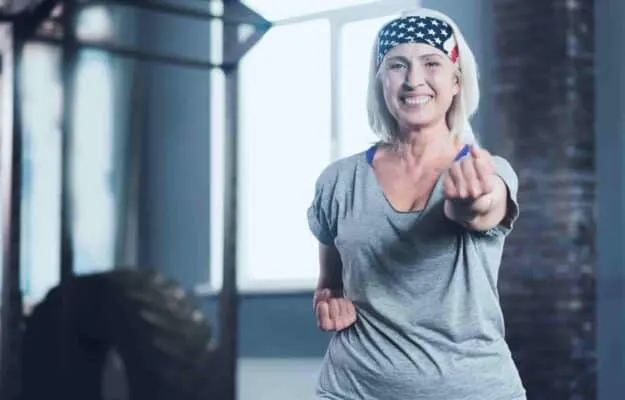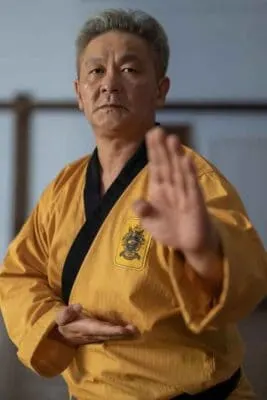
Disclaimer: The contents of this website, such as text, graphics, images and other material are intended for informational and educational purposes only and not for the purpose of rendering medical advice. The contents of this website are not intended to substitute for professional medical advice, diagnosis or treatment.
Getting old does not disqualify a person from learning a martial art, but you do need to choose the right martial art appropriate to your age. We picked out the ones we believe to be the safest martial arts for seniors yet still have practical application in real life.
Martial arts can improve seniors’ balance, mental acuity, and physical strength. The top 5 martial arts for seniors to study to stimulate the mind and body and learn a helpful self-defense art include the following.
- Brazillian Jiujitsu
- Aikido
- Krav Maga
- Karate
- Judo
Martial arts can be a hugely fulfilling and rewarding experience for senior citizens! Many martial arts can be tailored to the challenges of age and help to train our minds and bodies to slow the effects of the advancing years. Learning the right martial art as a senior can increase your enjoyment of life while learning a helpful skill!
Why Should Seniors Learn Martial Arts?
For seniors, martial arts can be an excellent way to stay active and healthy. But, just like any other muscle in the body, the brain needs exercise, too, and martial arts is no different.
Martial arts exercise mental and physical aspects, a great way to improve your body, mind, and memory.
No matter your senior age or fitness level, you can find a martial art that will benefit your physical and mental health.

Here are some benefits of learning martial arts as a senior:
- Increase range of motion. As seniors age, they often have difficulty performing specific movements. Martial arts help move all body parts to maintain suppleness and increase mobility.
- Increased muscle tone. The actions and movements involved in training martial arts will keep your muscles toned and healthy.
- Increase in fitness level. Keeping fit, especially heart health is a key to strong senior years. The cardio aspects of martial arts training will help to increase fitness and keep your heart strong.
- Improves balance. Most martial arts focus on balance to provide a stable platform to execute their techniques. The balance exercises will help senior citizens regain a greater level of balance.
- Increase mental acuity. Martial arts requires memorizing moves and techniques and learning new skills. This stimulates the brain’s activity and can help prevent diseases like dementia and Alzheimers. Some martial arts are low impact, making it possible to train in the art even with aging knees.
Martial arts also help keep seniors mentally alert as they practice new skills. So the benefits of martial arts go far beyond learning a few techniques and going to the gym once a week. The benefits include improved mental alertness and improved physical fitness.
Senior citizens can do martial arts, provided they choose the right martial art that caters to students of all ages, fitness levels, and mobility.
The best advice is to take it slow and don’t overdo the training sessions to prevent injuries that could prevent you from continuing your training.
How to Train in a Martial Arts School Safely
As a senior training in martial arts, you need to realize that you are not as young and strong as you once were, and wisdom must be exercised in your training routines.
- Keep your health conditions in mind. Tell your sensei or trainer of any health conditions or physical ailments you have so your training can be structured appropriately.
- Take it slow. Don’t try to keep up with the younger people in the class.
- Partner with people your own age. When practicing techniques, partner up with people of a similar age to yourself to avoid injury.
- Ask for a senior class. Some dojos offer training classes where all the students are seniors.
- Train sensibly. Don’t overdo your training and go too far too soon. You need to take your time and work up to improve strength, speed, and technique without causing injury.
RECOMMENDED READING: Tips That Can Help You Avoid COVID & Other Diseases at MMA Gyms
Top 5 Martial Arts For Seniors
We have selected some of the best martial arts that will benefit senior citizens, both from a technical point of view and from a practical use aspect.
These martial arts will train your body and mind and give you a helpful skill you can use for self-defense if the need arises.
1. BJJ Brazilian Jiu-jitsu For Seniors
Brazilian Jiujitsu, or BJJ, is called the “gentle art” for a reason. There are no impacts to the head in BJJ and less physical impact than in many other martial arts.
Brazilian Jiujitsu teaches takedown moves, ground fighting, and submission holds, focusing on joint locks and chokeholds.
The lack of strikes in this art makes it a perfect martial art for seniors to learn. In addition, the classes’ aerobic training routines will increase fitness and mobility.
Notify your trainer if you have any joint problems, as some of the joint locks can result in pain if they are executed too vigorously. Take your training at a slower pace, and you will enjoy the camaraderie and benefits of learning BJJ.
Brazilian Jiujitsu offers techniques that seniors can find very useful in self-defense situations because the moves to bring an opponent down and subdue them are not based on strength but rather on technique.
2. Aikido For Seniors
Aikido is also known as the martial art of love because the focus of the style is not to knock your opponent out, cause debilitating injury or kill. Instead, the focus of Aikido is to apply an appropriate response to the aggression to nullify the attack without causing harm to either party.
Aikido is an ideal martial art for the elderly since it’s low impact and does not require leaps, high kicks, or other physical activity beyond the scope of an older adult.
Aikido also has a strong mental and spiritual component which seniors will find therapeutic and stimulating.
Aikido uses throws which can be a problem for seniors with shoulder or back issues. Still, if you inform your sensei of these conditions, your training can be adapted to work around these injuries or limitations.
Aikido is ideal as a self-defense martial art for seniors because the techniques teach you to use your attacker or opponent’s strength and energy against them. For this reason, Aikido is often recommended as a useful martial art for many women and seniors.
3. Krav Maga
Krav Maga is an adaptive martial art, which means the techniques can be adapted for the person executing them. This makes Krav Maga a good choice as a martial art for seniors.
Krav Maga is a no-nonsense combat style that includes techniques from other disciplines and strikes, throws, and takedowns.
The training sessions do not include full-contact strikes or blows, so it is safe to participate in the training as a senior person.
The Krav Maga techniques are easier to learn than many other martial arts but require a lot of practice to master and execute accurately.
Krav Maga zeros in on self-defense in particular situations, so the training for a senior can be targeted for specific scenarios you are likely to encounter and teach you to defend yourself.
4. Karate For Seniors
Karate is more aggressive than other martial arts we have suggested for seniors. Still, the benefits of learning karate outweigh some concerns for seniors, as karate enhances or maintains cognitive abilities and improves physical strength.
Karate focuses on strikes, kicks, and the ability to anticipate an opponent’s strikes and provide an appropriate response.
Karate helps seniors maintain hand-eye coordination and improves concentration and mental focus skills. Karate can be dangerous for seniors because it is a contact sport that includes strikes and kicks. However, your sensei should tailor your training program for exercises and techniques more appropriate for your age and fitness level.
Karate teaches good self-defense fundamentals to seniors because it teaches students to anticipate an attack and provides the skills required to deal with it effectively.
Regular long-term karate practice had favorable effects on mood, perception of physical health confirmed by better postural control, and improved performance on objective physical testing. Adapted karate training would be an interesting option for maintaining physical activity in aging.
Marie-Ludivine, C. D., Papouin, G., Saint-Val, P., & Lopez, A. (2010). Effect of adapted karate training on quality of life and body balance in 50-year-old men. Open access journal of sports medicine, 1, 143–150. https://doi.org/10.2147/oajsm.s12479
5. Judo For Seniors
Judo is a martial art that focuses on throws and takedowns and has no kicks or punches. Leverage is used in many moves to take an opponent down rather than brute strength, which makes it an ideal martial art for seniors.
The Judo moves are relatively easy to learn but take time and patience to master. This martial art is quite physical, which increases aerobic exercise, promoting fitness and an increase in stamina. In addition, Judo will help to increase the flexibility and suppleness of joints and muscles.
Judo is a good style for senior citizens to learn for self-defense because it teaches how to escape holds where an attacker tries to hold you to subdue you. Understanding and executing Judo techniques will allow you to turn the tables on your attacker.
Seniors with injuries or issues to the back or problems with hips and knees may find Judo challenging and may need to look for an alternative martial art in this list.
RECOMMENDED READING: Which Martial Art Is Right For Me? – Getting Started Guide
Final Thoughts
We have all heard the colloquialism that age is just a number, but the fact is our bodies begin to slow down and deteriorate with age. Martial arts are a great way to slow down this decline and stay fit, keep in shape, receive mental and physical stimulation, and learn useful skills.
You are never too old or physically incapable of studying and benefiting from a martial art, but selecting the right martial art to learn is the key!
